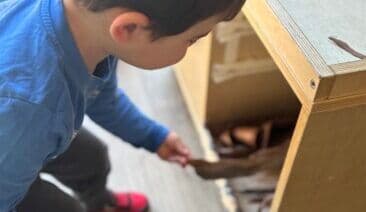In The Field
Practice
Quality
Research
Deconstructing Being Belonging and Becoming

Contributed Content
Jun 03, 2025
Save
An evolving perspective on the Early Years Learning Framework and its influence on educator practice, identity and leadership.
My ambitious attempt to deconstruct the term Being Belonging and Becoming started with my initial overview of the first version of the Early Years Learning Framework (EYLF), introduced with the National Quality Framework (NQF) in 2012. My experience was similar to most in the early education profession, initially I grappled with how this idealistic concept could look and feel in the new generation of a more professional early childhood education sector.On closer examination of the EYLF V1 and then later the EYLF V2 in 2024, I began to strengthen my own understanding, building a relationship with the guide. Unpacking what I understood and transferring this into practice. On further analysis I also reflected on how I could inspire or lead my teams on this transformative journey. In this profound moment, my own leadership experience began to change dramatically.
Reimagining professionalism through the framework
The early stages of deconstructing the term Being Belonging and Becoming, seemed to become more complex and complicated from what I had known and understood from my own experiences. My teams were asking, desiring, insisting on a more directive manual on how to achieve what seemed like the unachievable. Revisiting and rebuilding what we already knew and what we could be missing, this guide and vision statement presented itself as a new professional image, a profile we were not previously acquainted with in our own community as the childcare worker. This was when the replacement of the term sector emerged into a profession, and when we became educators.
Over the years the guide became more than just a tool, a booklet in assisting teams in their own professional learning process. It has become the foundation of what early learning could be and should be. A vision statement of how better outcomes for children are created and the beginning of the real potential to change quality. The evidence of Being, Belonging Becoming was becoming more evident with the collaboration and co-construction of learning happening between educators and the children. Educators actively listen to the wisdom and experiences of the children leading to greater possibilities to build upon learning. The Educators Guide still is imperative to inspire a whole generation with whom are the facilitators, discoverers and creators of early childhood education.

Influences from Reggio Emilia and the power of inquiry
Understanding the EYLF V2 has reintroduced and reignited my ongoing interest in the Reggio Emilia Approach. This approach echoes the necessity of building and maintaining meaningful connections with children, families, educational theories, environments, and communities. The EYLF V2 subtly hinting or provoking more thought towards what is really being said or done by children. The significance of these discoveries makes the once unremarkable, now remarkable.
At Majura Park Childcare, Torrens Early Learning Centre and Urambi Early Learning centre the Team Leaders are leading a teacher’s led inquiry on the Slow Pedagogy Approach. This teacher-led inquiry is informing practices and prompting more intentionality to the way we plan when considering how children be, belong and become. Our management team visits Reggio Emilia, in Italy annually. Inspired by the way the Reggio Emilia community view children in such a high image, children are the active citizens of their town and meaningfully contribute. This experience reaffirms our own company's understanding of how connections and relationships greatly impact children’s overall learning experiences. This has generated a more collaborative approach to learning, through a more holistic lens within our three centres.
Mapping meaning, shaping culture
Throughout our centres we have embedded a simple process of mapping discussions, we refer to this as the Maps of Meaning, collating ideas, values, beliefs, and concepts that inform practice and planning. Creating a marvellous tangled web of possibilities, whilst ensuring that as a team we are providing more clarity on what is really happening around us. This ensures that Being, Belonging and Becoming develops into more than just three words but as a part of the companywide philosophy. Allowing us to celebrate the joy of learning, the community we are and the magic of early childhood for every child.

“Learning and teaching should not stand on opposite banks and just watch the river flow by; instead, they should embark together on a journey down the water. Through an active, reciprocal exchange, teaching can strengthen learning and how to learn.”
Malaguzzi, L. 1998, ‘History, ideas and philosophy’, in Edwards, C. Gandini, L. and Forman, G. 1998, The Hundred Languages of Children: The Reggio Emilia Approach, Ablex Publishing, Greenwich (p83). https://reggioaustralia.org.au/quotes-and-references/

By Joanne Cosentini
Joanne has worked within the early childhood profession for over 38 years and holds her Bachelor in Education 0-5 years and an Advance Diploma in Leadership and Management. Joanne is currently working in Canberra as the Managing Director of three local centres - Majura Park Childcare, Torrens Early Learning Centre and Urambi Early Learning Centre.
Don’t miss a thing
Related Articles



















